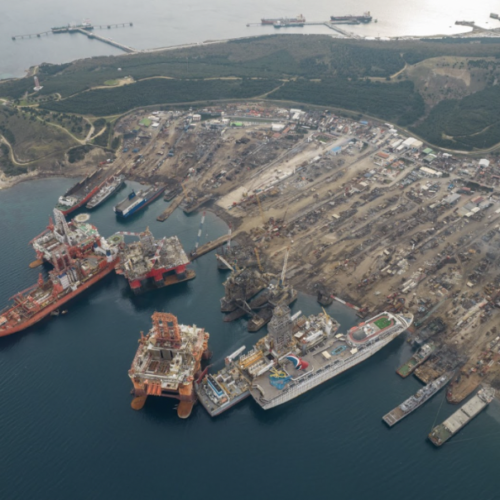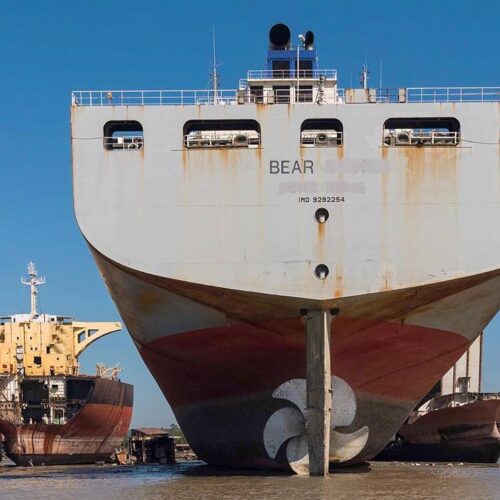Press Release – Ship recycling in Aliağa under the spotlight
NGOs call on Turkey and the EU to bring needed change and transition the sector towards dry docks
The NGO Shipbreaking Platform publishes today its report Ship Recycling in Turkey: Challenges and Future Direction. While the report provides a comprehensive analysis of the current challenges faced by the ship recycling sector in Aliağa [1], it also underscores the immense potential for driving forward sustainable ship recycling practices and demonstrates a clear path towards achieving this goal. [2]
Turkey stands at a crossroads as the recent announcement of plot sales in October 2023 and the upcoming expiration of public land leases in 2026 create an opening to bring needed change to its ship recycling industry.

Some of the key operational priorities highlighted in the report include putting in place effective drainage channels and the use of oil-water separators for waste water treatment. Additionally, there is a need for third-party verification of hazardous materials during dismantling, proper operations for hazardous waste removal, and the establishment of standards for secure pulling and lifting equipment, along with introduction of proper gas-free operations and cold-cutting techniques.
To ensure adequate oversight of the sector, a comprehensive Environmental Impact Assessment (EIA) is necessary. This assessment should define environmental licensing processes and enforce existing legal instruments for permitting and monitoring, taking into consideration both safety and environmental aspects. It is also important to continuously monitor the environment in and around ship recycling yards to identify sources of pollution and develop effective remediation strategies. Furthermore, occupational health monitoring is required to identify the underlying causes of accidents and work-related illnesses.


Whilst two yards in Aliağa were removed from the EU list of approved ship recycling facilities last year, other non-compliant yards have been allowed to remain listed. As stressed in the report, the lack of governance that allows yards to operate without EIAs or adequate monitoring underscores the necessity for more frequent and unannounced EU inspections, including cross-referencing hazardous waste records and incorporating workers’ perspectives and experience to inform evaluations.
Recognising the pivotal role of the European Union (EU) in driving improvements, the report also recommends strengthening the criteria for ship recycling, including waste management and steel recovery operations, under the EU Ship Recycling Regulation.

NOTES
[1] Problems identified in the report include high levels of air, soil and water pollution, dysfunctional waste water management systems, failure to provide appropriate protective equipment to workers, irregularities in asbestos management, lack of Environmental Impact Assessments and poor monitoring of the sector.
[2] This path towards sustainable ship recycling in Turkey involves the implementation of a thorough Environmental Impact Assessment, new industrial platforms to ensure containment, cutting-edge technologies to minimize risks, ensuring safe working conditions and worker participation, and implementing a robust waste management plan to safeguard workers, local communities, and the environment.
[3] The UAE has surpassed the standards set in the EU Ship Recycling Regulation through the introduction of new national rules that prohibit the use of beaching (as practices in Alang in India, Chattogram in Bangladesh and Gadani in Pakistan) and landing methods (as practiced in Aliağa in Turkey), and require the use of dry docks.
FULL REPORT
Related news

Press Release: Need for reform of ship recycling sector in Turkey has never been more apparent after massive fire and waste dumping scandal revealed
In recent months, Turkey’s ship recycling sector has experienced significant movements. From controversies surrounding the sale of shipbreaking yards to the arrival of a UK Navy vessel,… Read More

Platform News – NGO Shipbreaking Platform presents Impact Report 2018/2019
These past two years the Platform has won support for sustainable ship recycling in the financial sector while raising the stakes for ship owners who opt for… Read More

Press Release – Turkish authorities ban the entrance of toxic aircraft carrier São Paulo
Turkey has finally banned the toxic aircraft carrier SÃO PAULO from entering its national waters.
... Read More
Platform News – Latest report on ship recycling in Turkey presented in Izmir
Attending the event, representatives from local NGOs, unions and concerned citizens engaged in a constructive dialogue.
... Read More
Press Release – Major explosion at Bangladesh shipbreaking yard kills two workers and severely injures five
A fire broke out on board the Malaysian-owned vessel BUNGA KELANA 4, beached at Mahinur Ship Breaking yard.
... Read More
Press Release – Ship owner and two directors fined by Dutch Court for breaching EU waste law
Dutch company Jumbo and two of its directors fined for their involvement in the illegal export of an end-of-life ship to Turkey for recycling.
... Read More

